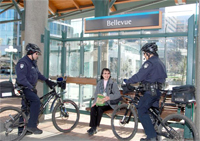Published November 18 2015
Also, electrical facilities, winter weather and transportation plan
The City Council is considering adding five bike patrol officers to the police force to stem a rise in property crimes, including car thefts and prowls, in the downtown, BelRed and Factoria areas.
In 2011, at the height of the recession, the city cut its five-officer bicycle patrol as part of an effort to balance the budget. Police Chief Steve Mylett is asking the council to add those positions back to the city's budget as a mid-biennium adjustment.
"The bike team is a very versatile tool," Mylett told the council Monday. "It's very mobile and we're able to use it in very different capacities. The bikes are able to get into places a police car can't."
According to a memo prepared for the council, a bike patrol could help police fight property crimes, which rose by 21 percent in Bellevue from 2010 to 2014.
Mayor Claudia Balducci noted the reduction of the bike patrol had been an "unfortunate" necessity. "If we now have the money to bring it back, I know it's been high on the priority list for the council," she said.
The restoration of a five-officer bike patrol would cost $680,000 next year, then $530,000 annually after that. Assistant Finance Director Toni Rezab told the council that rising revenue would support the restoration of the bike patrol.
The council will review adjustments to the budget over the next few weeks, including during a public hearing set for Nov. 23. The council is scheduled to approve mid-biennium adjustments on Dec. 7.
Electrical reliability expertise
The council reviewed progress on implementation of recommendations from a 2011 study of electrical reliability in Bellevue, and asked staff to draw up a short-term budget measure to pay for additional electrical engineering expertise to help.
The city commissioned the Electrical Reliability Study after storms caused extended outages from 2006 to 2010. Puget Sound Energy maintains the city's power grid; the city is an "informed stakeholder," monitoring the utility's work.
In addition to seeking additional electrical engineering expertise, the council acknowledged continuing work with PSE around reliability monitoring, long-range planning, energy sustainability and vegetation management, and directed staff to draft an agreement memorializing its partnership with the utility.
Winter weather preparedness
Also on Monday, the council received a management brief on how city staff prepare for and respond to events such as flooding, wind storms, landslides and snow.
During a snow storm, the Transportation Department works closely with the Utilities, Parks and Civic Services departments to provide a coordinated response. Equipment includes seven four-by-four vehicles to clear snow in the hills and eight larger trucks used primarily on level terrain and main arterials.
Even with the fleet of sanding and snow removal equipment, crews face challenges in Bellevue due to the range in elevation, from lake level up to more than 1,400 feet, and some of steepest city roads in the region. In a snow storm that impacts the entire city, it's virtually impossible to service residential streets until the most important arterial streets are cleared.
The focus of the response is always to do the most good for the most people. To help meet the challenge, the city uses a snow response priority map to ensure resources are deployed efficiently. The map, as well as information on other emergency events, can be found on the city's emergency preparedness web pages. There, people also can sign up to receive email or text notifications with updates about weather conditions and city responses.
Transportation Facilities Plan
The council indicated its support for the Transportation Commission's recommended 2016-2027 Transportation Facilities Plan. The 12-year TFP, considered an intermediate-range planning tool, identifies improvements to meet future development needs and serves as the basis for the city's transportation impact fees program.
The city collects impact fees from developers to pay for a portion of roadway and intersection improvements needed to serve new growth and development. Of the 55 roadway or intersection capacity projects listed in the TFP, 16 of them will be partially paid for with impact fees. The council will discuss a scheduled increase to impact fees, as well as technical adjustments to the program, at its Nov. 23 meeting.

